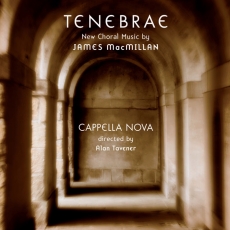MacMillan: Tenebrae - Cappella Nova - AllMusic.com
The contemporary composer who writes music for use in churches faces the challenge of keeping the music simple enough for amateur choirs without sacrificing or compromising musical interest. (British composers have an advantage in this area because there are so many excellently trained British choirs.) James MacMillan is the most prominent Scottish composer working around the turn of the millennium, and as a devout Catholic, devotes a significant part of his creative output to church music. This CD, which includes music written over a thirty-year span, shows that MacMillan is capable of writing music of the highest quality for choirs of varying skill levels. Although none of these pieces would be considered easy, some are within the grasp of the disciplined church choir, and the most difficult aren't beyond the abilities of the very fine British choirs for which they were written.
The most significant body of work recorded here is a selection of his Strathclyde Motets, written for the Strathclyde University Chamber Choir, but with a very specific liturgical function: they are Eucharistic motets, written as an aid to meditation, in the time in the service after a congregant has received Communion. Macmillan's motets are remarkable in the atmosphere of hushed awe they create, what the composer describes as suspended animation. He writes, "They don't seem to go anywhere, they kind of float as an entity, and there are one or two ideas that sort of ease into being and just exist ..." His description accurately conjures up the mystical mood they create, but doesn't do justice to the intensely imaginative and inventive methods, which are far from simple, with which achieves this timeless, ecstatic state. These motets are clearly the work of a master of choral writing, and a major talent. His Missa Brevis, written when he was 17, shows no signs of being a piece of juvenilia, but its technical requirements, along with those of the introit, Give me justice, make it reasonable for good amateur choirs to perform. The three Tenebrae Responsories inhabit a similar aesthetic world as the motets, and make the most fearsome demands on its performers. The Scottish choir, Cappella Nova, conducted by Alan Tavener, sings with extraordinary discipline, precision, and passion, and their choral blend is gorgeous. Linn's sound is clean but nicely resonant.

